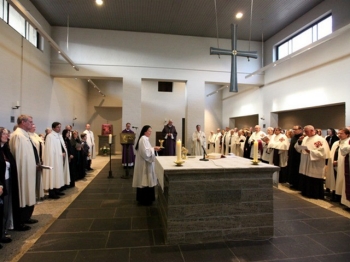Living mercy, being open to Providence and building relationships

Year of Mercy
In this Holy Year the intensification of our spirituality was founded on mercy. Our national gatherings and the activities in the various regions were opportunities for us to consider what mercy truly means, and how we can be compassionate in our interactions with our fellow human beings and with God’s creation.
Monsignor de Korte, Bishop of ’s-Hertogenbosch, gave an address on God’s compassionate love and our response. The Year of Mercy offers an excellent opportunity to return to the Holy Scripture, to restore our focus on the God of the Bible. The Old Testament portrays God as the uplifting mercy through whom life is possible. In the New Testament Christ becomes the face of God’s mercy. He is God’s mercy given form. Love of one’s neighbour as a divine virtue must be twofold: forgiveness works one way, but reconciliation works both ways. This is not simple, but it is Jesus Christ’s command. Monsignor de Korte called on the members of the Order to set an example for their children and grandchildren, by integrating Catholic social thought into our everyday actions and so determining our position in life. Pope Francis exemplifies this wonderfully. A culture of mercy is at the root of the pursuit of Christian holism.
The Lieutenancy also helped the refugees in the Netherlands. In 2015 the country experienced a large influx of refugees, predominantly from countries in the Middle East. Those refugees were housed in shelters overseen by the COA (the Central Agency for the Reception of Asylum Seekers).
The spiritual needs of the refugees require just as much attention as material aid. This is where we can show our solidarity and human closeness. Members of the Northern/Eastern region joined the Syriac Catholic refugees to celebrate mass with the Syriac Catholic parish in the former Willibrordus Church in Arnhem. Mass was followed by a shared meal, where our members listened to the refugees’ stories and experiences, and shared their concerns.
At the national gatherings for the Feast of the Cross and Advent, we asked members to donate food to share in that parish.
A working group has been set up to improve our ties with the refugees, and where possible offer material aid through donations at our national gatherings.
In this special Year of Mercy, we visited places where mercy takes tangible form: in prisons, at the Sant’Egidio community in Amsterdam and at the Little Sisters of Jesus in IJburg (also in Amsterdam) – places and people who reflect God’s closeness.
Canonesses Regular of the Holy Sepulchre of the Emmaus Priory in Maarssen
With the sisters dwindling rapidly in number, the community of the Emmaus Priory in Maarssen near Utrecht has regrettably been forced to close the priory effective the end of December 2016.
The sisters in Maarssen were by our side for sixty years. They were there when our Lieutenancy was founded, and down the years they gave their hearts and souls for our Lieutenancy. Many of our observances for the start of Advent and the Feast of the Cross, regional gatherings and committee meetings were held there. Over time a close sense of kinship formed between the sisters and the Lieutenancy, at the heart of which was our shared faith in Christ resurrected.
They never hesitated to make their Priory available and always gave us a warm welcome. We were a visible, and often audible, presence, not always respectful of the peace and quiet of the Priory. Visiting Maarssen was like coming home, to our sisters, fellow pilgrims on the path to heavenly Jerusalem. The sisters listened to our members talk about their joys and concerns with patience and empathy.
Our spiritual kinship with the sisters will remain. We have a firm footing based on our shared religious foundations: the faith in the resurrection that will make everything anew. That was their life, and how they bore witness to their faith in their daily lives. This was expressed in the sisters’ observances, in their prayers and in every activity undertaken from their Priory.
The sisters underlined their kinship with our Lieutenancy by gifting us various objects from the Priory. During our observances at the start of Advent they presented us with their chalice and their ciborium. We will use them as we celebrate mass in the future, with great gratitude and in cherished memory of our sisters of the Priory in Maarssen. We will remain joined in prayer, and our lasting kinship will be reflected in our invitations to the sisters to join us at our national gatherings.
Increasing activity among our members
That our Lieutenancy is alive and well is demonstrated by the number of members who take part in gatherings and activities. We rejoice in seeing so many of our members regularly attend national, regional and at-home gatherings.
However, we are concerned about the members who do not take part. Their decision to stay away might be based on a variety of reasons: some could be worried that they might no longer see any familiar faces, some have mobility impairments. We should all make an effort to help these members overcome their barriers. Attending gatherings together and playing a “buddy” role for a fellow Order member might help make this easier.
We should also pay more attention to those among us who suffer from poor health, and spouses of Order members who have passed away who are becoming isolated. We ask the regional committees to inquire about the reasons for long-term absences of members, and to consider how we can include these members in our Lieutenancy’s activities. We all have a duty to be brothers and sisters to the other members of our Order, in particular those suffering from poor health or old age. Our fraternity is a personal task and responsibility, and cannot be delegated to others.
(May 2017)



